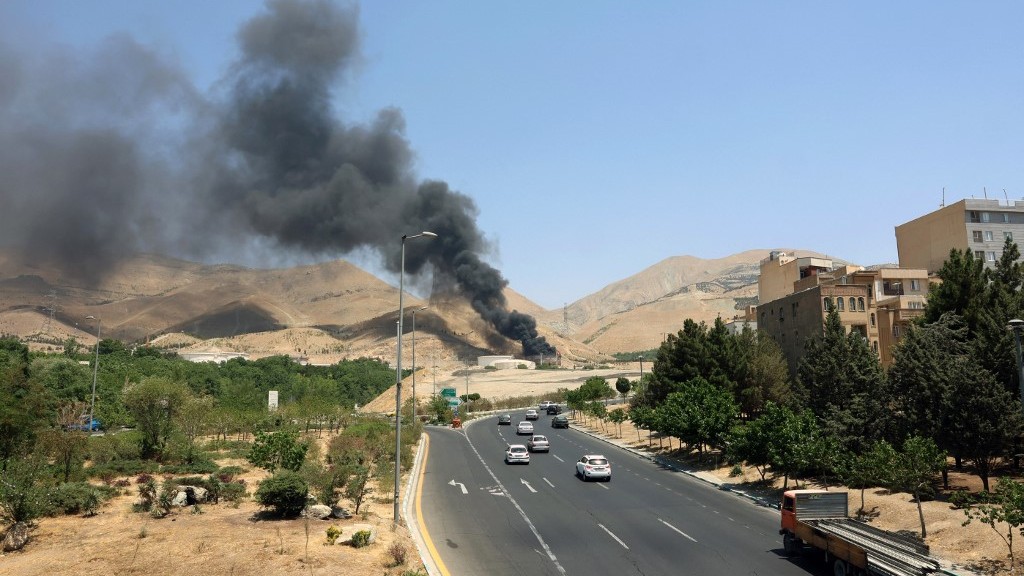An Israeli strike in western Iran on Monday heavily damaged a hospital, as the conflict between the two regional rivals escalated.
At least 224 people have been killed by Israeli strikes on Iran, including top military commanders, nuclear scientists and civilians, while Iranian strikes in Israel have killed at least 24.
The state-backed Fars news agency released a video of a hospital in Kermanshah city showing shattered glass, collapsed ceilings, and extensive damage in patient rooms.
“Following the Zionist criminal regime’s attack on a nearby workshop in Kermanshah city, Farabi Hospital also suffered serious damage,” the Tasnim news agency reported.
Iranian President Masoud Pezeshkian called on Iranians on Monday to “unite” and “stand together” against this “criminal aggression”.
New MEE newsletter: Jerusalem Dispatch
Sign up to get the latest insights and analysis on
Israel-Palestine, alongside Turkey Unpacked and other MEE newsletters
The Israeli army claims to have destroyed “a third” of Iran’s surface-to-surface missile launchers since it launched its surprise attack on Friday.
Defence Minister Israel Katz warned that Tehran’s residents “will pay the price” for the Israeli civilians killed by Iranian strikes.
AFP images of Tel Aviv showed gutted buildings where firefighters were searching for survivors.
Other missiles hit the cities of Petah Tikva and Bnei Brak, near Tel Aviv, as well as Haifa in northern Israel, sending thick black smoke billowing into the air.
Strikes on nuclear facilities
Israel on Friday launched strikes on Iran’s nuclear facilities, alleging the country sought to develop nuclear weapons, an accusation Tehran has always denied.
The Iranian government urged the UN’s International Atomic Energy Agency on Monday to condemn Israeli attacks on its nuclear sites.
“We expect the (IAEA) board of governors and the director general to take a firm position in condemning this act and holding the regime (Israel) accountable,” said foreign ministry spokesman Esmaeil Baqaei during a weekly press briefing.
The head of the IAEA said on Monday there was “no indication of a physical attack” on an underground section of Iran’s Natanz uranium enrichment site following strikes that destroyed the plant above ground.
The agency said a key above-ground component of the Natanz site where Iran was producing uranium enriched to up to 60 percent – short of the 90 percent required to produce weapons-grade material – had been destroyed in the attacks.
Addressing an extraordinary board meeting on Monday, IAEA chief Rafael Grossi said there had been “no additional damage” at the Natanz site since Friday.
On Saturday, US President Donald Trump said he held an hour-long phone call with Russian President Vladimir Putin where they discussed the conflict and how it should come to an end.
“President Putin called this morning to very nicely wish me a Happy Birthday, but to more importantly, talk about Iran, a country he knows very well,” Trump wrote in a Truth Social post.
“He feels, as do I, this war in Israel-Iran should end, to which I explained, his war should also end,” Trump said, referring to Russia’s war on Ukraine.

Israel attacks Iran: Tehran’s residents fearful and angry after strikes
Read More »
However, in an interview with the Atlantic magazine, Trump appeared to push back against his “America first” supporters who argue the US shouldn’t be funding Israel’s wars, saying stopping Iran’s nuclear programme was a prerequisite for peace.
“For those people who say they want peace – you can’t have peace if Iran has a nuclear weapon,” he said. “So for all of those wonderful people who don’t want to do anything about Iran having a nuclear weapon – that’s not peace.”
Middle East Eye reported on Saturday that the US and Israel altered Israel’s F-35 warplanes to extend their range without the need for refuelling or compromising on stealth ahead of the attacks.
The Israeli strikes have halted negotiations between the US and Iran over the country’s nuclear programme, the latest round of which was planned for Sunday.
Ryan Costello, policy director with National Iranian American Council, told MEE on Friday that prospects for a new deal were looking bleak.
“While we hope that the war will not spread out of control, Iran will not negotiate a nuclear deal when under active bombardment,” he said.
“Diplomatic efforts need to pivot to ending the bombing and keeping the US out of the war. Unfortunately, Trump’s initial remarks after the strikes do not seem grounded in that reality, and risk ensuring the US is a target in any reprisals.”

